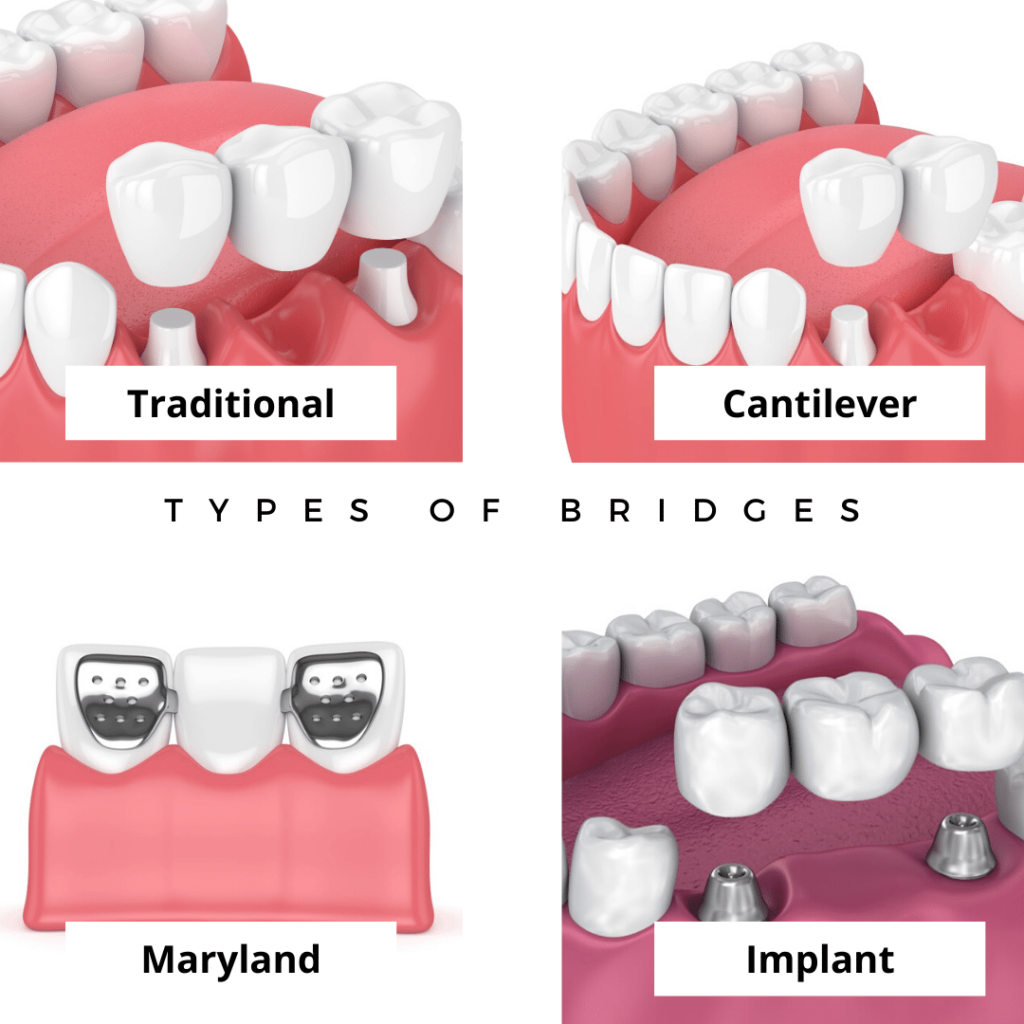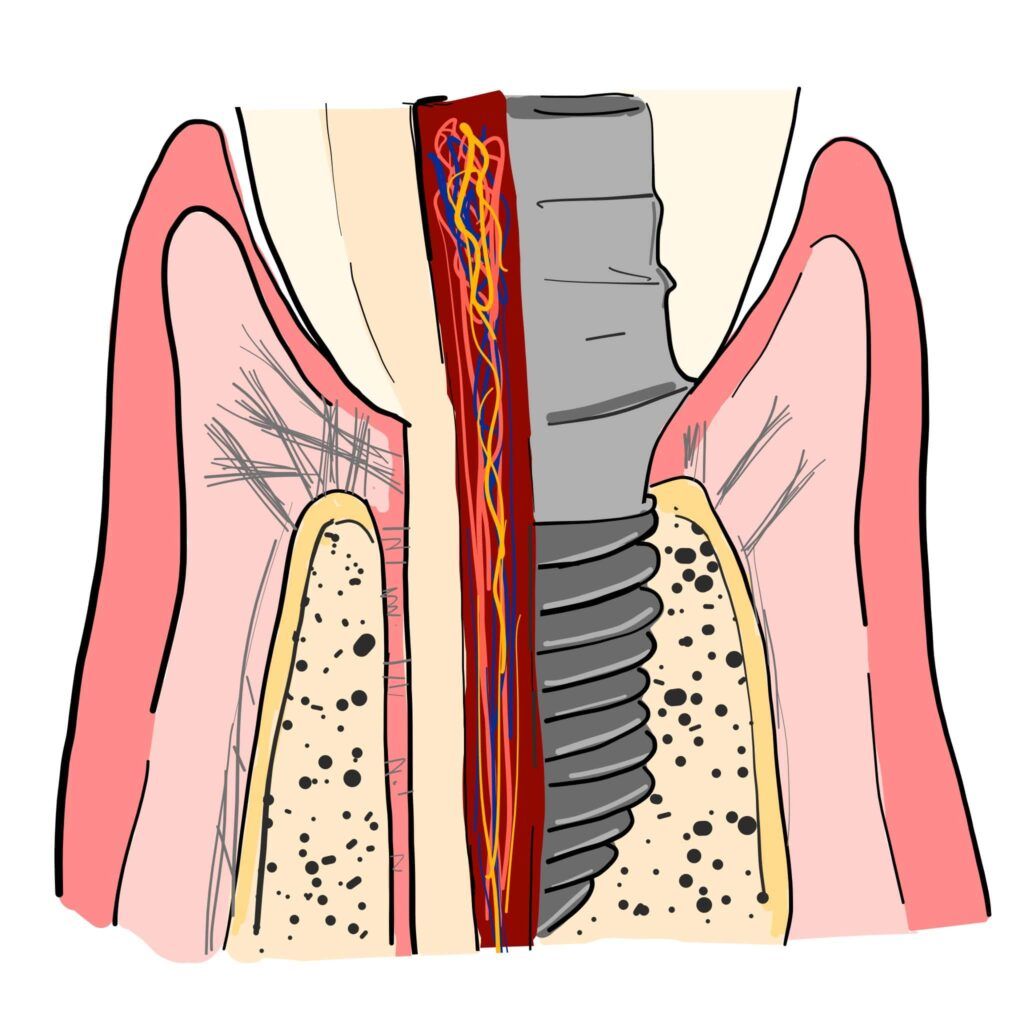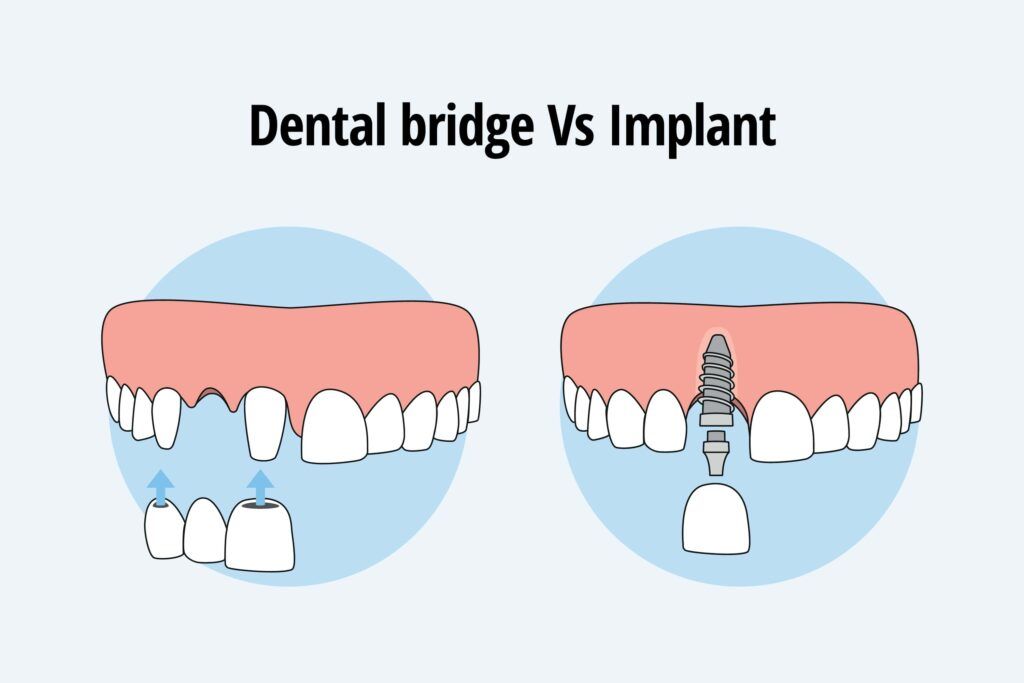Your smile is one of your most valuable assets, and when you’re missing a tooth or two, it can be challenging to feel confident and carefree. Fortunately, modern dentistry offers several solutions to restore your smile and oral health, with dental bridges and dental implants being two popular choices. But how do you decide which option is best for you? It’s a question many people face when they’re on a quest to regain their pearly whites and chewing function. In this blog, we’ll dive into the world of dental restorations, exploring the pros and cons of dental bridges and dental implants, so you can make an informed decision that suits your unique needs and preferences.
Understanding Dental Bridges
Dental bridges are a popular and effective solution for replacing missing teeth. As the name suggests, they “bridge” the gap left by one or more missing teeth, restoring both the aesthetics and function of your smile. These prosthetic devices consist of one or more artificial teeth, known as pontics, that are anchored in place by crowns attached to the natural teeth or dental implants adjacent to the gap.
There are several types of dental bridges, each designed to address different situations and patient needs:

- Traditional Bridges: These are the most common type of dental bridges. They consist of one or more pontics held in place by dental crowns, which are cemented onto the teeth adjacent to the gap. Traditional bridges are ideal when you have strong, healthy natural teeth on both sides of the gap.
- Cantilever Bridges: Similar to traditional bridges, cantilever bridges use dental crowns to hold the pontic in place. However, they are only anchored to one adjacent tooth rather than both sides of the gap. This type of bridge is typically used when there’s only one healthy tooth next to the gap.
- Maryland Bridges (Resin-Bonded Bridges): Maryland bridges are a conservative option that involves bonding a pontic to the back of adjacent teeth using metal or porcelain wings. Unlike traditional bridges, this type of bridge preserves more of the natural tooth structure, making it a less invasive option.
- Implant-Supported Bridges: These bridges are supported by dental implants instead of natural teeth. Implant-supported bridges are an excellent choice when you have multiple adjacent missing teeth or when the surrounding natural teeth are not strong enough to support a traditional bridge. They provide stability and do not require the alteration of neighboring healthy teeth.
Choosing the right type of dental bridge depends on various factors, including the number of missing teeth, the condition of adjacent teeth, your oral health, and your budget. Consulting with a dentist is crucial to determine which type of dental bridge is best suited to your specific needs and circumstances.
No matter the type of bridge chosen, dental bridges can significantly enhance your smile’s appearance, restore your ability to chew and speak comfortably, and prevent adjacent teeth from shifting out of alignment. With proper care and maintenance, dental bridges can last for many years, allowing you to enjoy a beautiful and functional smile.
Pros of Dental Bridges:
- Cosmetic Improvement: Dental bridges can restore your smile by filling in gaps caused by missing teeth, enhancing your overall appearance.
- Functional Restoration: They improve your ability to chew and speak properly, as well as maintain the alignment of surrounding teeth.
- Quick Procedure: Getting a dental bridge is typically quicker and less invasive than some other tooth replacement options.
- Cost-Effective: In many cases, dental bridges are more budget-friendly than dental implants.
Cons of Dental Bridges:
- Affects Adjacent Teeth: The preparation of adjacent teeth for crown placement can weaken them and may require removing healthy tooth structure.
- Shorter Lifespan: Dental bridges have a lifespan of 5-15 years, which is generally shorter than dental implants.
- Oral Hygiene Challenges: Cleaning under and around the bridge can be challenging, potentially leading to gum disease or decay.
- Not Suitable for All Cases: Bridges are not ideal if you have multiple missing teeth or if the surrounding teeth are not strong enough to support the bridge.
- Possible Future Replacement: Due to wear and tear, bridges may need replacement, which could involve additional dental work and costs.
Before opting for a dental bridge, it’s essential to consult with your dentist to assess your specific situation and discuss whether this option aligns with your dental health goals and needs.
Understanding Dental Implants
Dental implants are a revolutionary and highly effective tooth replacement option that mimics the natural look, feel, and function of real teeth. These small, titanium posts are surgically placed into the jawbone, where they serve as sturdy foundations for artificial teeth, providing a long-lasting solution for missing teeth. Dental implants offer numerous benefits, making them a popular choice among both patients and dental professionals.
There are several types of dental implants, each designed to address specific dental needs and conditions:

- Endosteal Implants: Endosteal implants are the most common type of dental implants. They are surgically placed directly into the jawbone and are typically shaped like small screws, cylinders, or blades. These implants are suitable for most patients and can support single crowns, bridges, or even dentures.
- Subperiosteal Implants: Subperiosteal implants are positioned on top of the jawbone but beneath the gum tissue. They consist of a metal framework that protrudes through the gums and holds the artificial teeth in place. Subperiosteal implants are often recommended for patients who have insufficient bone height for traditional implants.
- Zygomatic Implants: Zygomatic implants are a specialized type of implant used when there is minimal bone in the upper jaw. These implants are anchored in the zygomatic bone (cheekbone) rather than the maxillary bone. They provide a stable foundation for implant-supported dentures or bridges in cases where traditional implants are not feasible.
- All-on-4/All-on-6 Implants: These are specific implant techniques that involve using only four or six strategically placed implants to support a full arch of teeth (usually for the upper or lower jaw). All-on-4 and All-on-6 procedures are known for their efficiency and reduced healing time.
Choosing the right type of dental implant depends on your individual oral health, bone density, and specific tooth replacement needs. Your dentist or oral surgeon will assess your condition and help determine which implant option is best suited for you.
Pros of Dental Implants:
- Natural Look and Feel: Dental implants closely resemble natural teeth in appearance and function, providing a lifelike smile and comfortable chewing.
- Durability: Implants are designed to be long-lasting and can potentially last a lifetime with proper care.
- Preservation of Jawbone: Dental implants stimulate the jawbone, preventing bone loss that often occurs with missing teeth.
- Improved Oral Health: Unlike traditional bridges, implants do not require the alteration of adjacent teeth, preserving their integrity.
- Enhanced Confidence: Implants offer a secure and stable solution, allowing you to speak and eat with confidence.
Cons of Dental Implants:
- Surgical Procedure: The placement of dental implants involves oral surgery, which may require a recovery period and carry some risks.
- Time-Consuming: The entire implant process can take several months, including healing and integration of the implant with the bone.
- Cost: Dental implants tend to be more expensive upfront compared to some other tooth replacement options.
- Not Suitable for Everyone: Some individuals may not be good candidates for implants due to factors like insufficient bone density or certain medical conditions.
- Maintenance: While implants are low-maintenance, they require regular oral hygiene practices and dental check-ups to ensure their longevity.
Overall, dental implants offer a permanent and highly reliable solution for missing teeth. However, the decision to get implants should be made in consultation with your dentist or oral surgeon, taking into consideration your specific oral health needs, budget, and personal preferences.
How to Decide Between Dental Bridges and Dental Implants
When deciding between dental bridges and dental implants, several important factors should be considered to ensure you choose the most suitable option for your specific dental needs and circumstances. Here are the key factors to take into account:
Oral Health and Tooth Condition:
- The health and condition of the adjacent teeth: Dental bridges require the preparation of adjacent teeth to support the bridge. If these teeth are healthy and strong, a bridge may be a viable option.
- The presence of gum disease or decay: Dental implants may be preferred when there are oral health issues that make the preparation of adjacent teeth for bridges less desirable.
Number of Missing Teeth:
For a single missing tooth, both dental bridges and dental implants are viable options. However, for multiple missing teeth in a row, dental implants may be a more stable choice.
Longevity and Durability:
Dental implants tend to have a longer lifespan, potentially lasting a lifetime with proper care, whereas dental bridges typically have a lifespan of 5-15 years.

Cost Considerations:
Dental bridges are generally more cost-effective upfront compared to dental implants. However, implants may offer better long-term value due to their durability.
Aesthetics:
Dental implants often provide a more natural and aesthetically pleasing appearance since they stand alone and don’t require the placement of crowns on adjacent teeth.
Bone Health and Density:
Dental implants stimulate the jawbone, preventing bone loss, while bridges do not. Consider your jawbone health and density when deciding between the two options.
Treatment Time:
Dental implants typically require a longer treatment timeline, including healing and integration of the implant with the bone, whereas bridges can be placed more quickly.
Maintenance and Oral Hygiene:
Dental bridges may require special flossing techniques to clean under the bridge, while dental implants can be maintained much like natural teeth.
Overall Health and Medical Conditions:
Certain medical conditions or medications may impact your eligibility for dental implants, so discuss your medical history with your dentist.
Personal Preferences:
Your comfort level with oral surgery, your aesthetic preferences, and your willingness to invest time and resources in your dental restoration should also be considered.
Ultimately, the decision between dental bridges and dental implants should be made in consultation with your dentist or oral surgeon. They will evaluate your unique oral health situation, discuss your goals and preferences, and help you choose the option that best suits your needs and provides the best long-term outcome for your oral health and smile.
Conclusion
In conclusion, the choice between dental bridges and dental implants is a significant decision that should be guided by a careful consideration of your individual oral health, preferences, and circumstances. Both options offer valuable solutions to replace missing teeth, each with its own set of advantages and considerations. Whether you prioritize aesthetics, longevity, or functionality, consulting with a trusted dentist or oral surgeon is essential to determine the best fit for your specific needs. Ultimately, the goal is to restore your smile, enhance your quality of life, and regain your confidence. So, take the time to explore your options, ask questions, and make an informed choice that will lead you to a happier, healthier, and more radiant smile for years to come. Your perfect smile awaits.

Irfan Atcha, DDS, DICOI, DADIA at New Teeth Chicago Dental in Chicago, Illinois is a board-certified general dentist and a nationally recognized expert in dental implants, cosmetic dentistry, and sedation dentistry. Dr. Atcha is now serving patients in Naples, Bonita Springs and SW FL area with All-on-4 implants, teeth-in-a-day, same day dental implants and the complex zygomatic dental implants for the no-jaw bone solution approach. To schedule a consultation please email Dr. Atcha at teethforyou@gmail.com.

